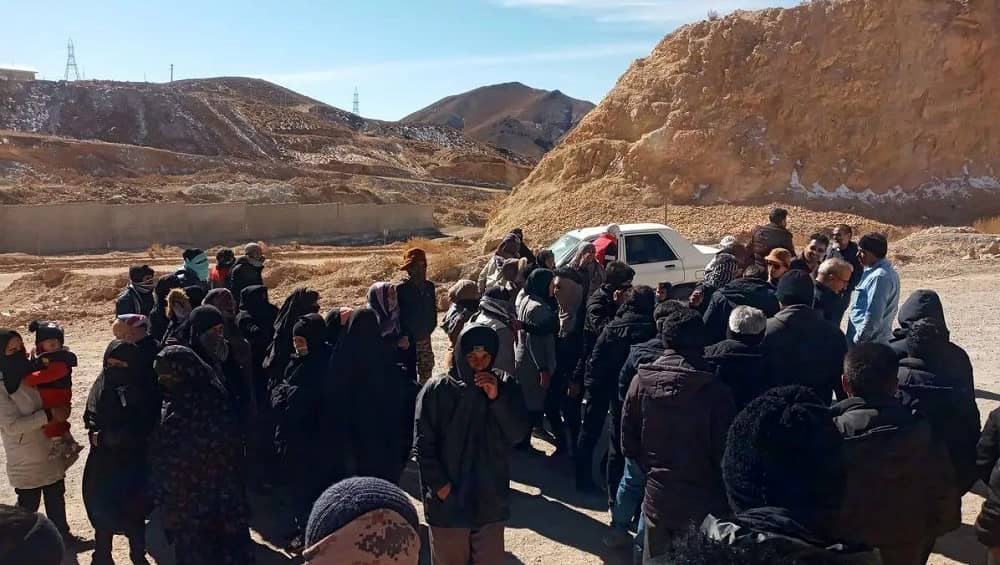Facebook
Twitter
LinkedIn
Pinterest
Reddit
Email
Print
 Rabor, Kerman Province, Southeast Iran – Laid-off workers of Daralu Copper Plant protest job dismissals- December 17, 2024
Rabor, Kerman Province, Southeast Iran – Laid-off workers of Daralu Copper Plant protest job dismissals- December 17, 2024
Protests broke out in multiple cities across Iran on December 17, with workers, students, drivers, and merchants staging demonstrations to demand fair wages, stable electricity, and an end to systemic economic hardships. These rallies reflect the growing frustration with government mismanagement and neglect.
In Tehran, Iran’s capital, university entrance exam applicants gathered in front of the Education Ministry to protest unfair regulations limiting access to higher education. Protesters demanded revisions to the policies, which they argue hinder equal opportunities for students. Simultaneously, in Shamsabad Industrial City, located in Tehran Province (northern Iran), factory owners and producers protested recurring power outages that have caused significant economic damage, forcing many factories to halt production.
In Isfahan, Isfahan Province (central Iran), merchants staged demonstrations in response to frequent and prolonged power outages. Protesters decried the devastating impact of electricity cuts on their businesses, with reports of losses escalating due to disrupted operations.
Workers of the Fajr Jam Gas Refinery in Bushehr, Bushehr Province (southern Iran), held a rally inside the refinery premises, demanding the elimination of intermediary contracting companies, implementation of fair wage classification systems, and access to the same benefits enjoyed by formal employees. Contract drivers employed at the refinery also joined the protests, demanding job security, fair overtime compensation, and allowances for vehicle maintenance amid rising inflation and high costs of spare parts. Municipal workers in Bushehr continued their own protests, demanding two months of unpaid wages and the resolution of long-standing insurance problems. Workers reported that their year-end bonuses and pensions for 2023 remain unpaid.
More footage of protest rally by university entrance exam applications in Tehran.#Iran #IranProtests pic.twitter.com/nGG7xq5kpp
— People’s Mojahedin Organization of Iran (PMOI/MEK) (@Mojahedineng) December 17, 2024
In Arak, Markazi Province (central Iran), residents held protests to express anger over unresolved economic and infrastructural issues. While specific details remain limited, reports suggest mounting frustration over local governance and failures to provide basic services.
In Kerman, Kerman Province (southeastern Iran), drivers of the Zarand Steel Company staged demonstrations, voicing their frustration over delayed wages and poor working conditions. Protesters demanded prompt action to resolve their economic grievances and improve job security.
In Tabriz, East Azerbaijan Province (northwestern Iran), property owners of the “Atlas” housing project rallied to protest delays in delivering promised homes. Demonstrators accused authorities of mismanagement and corruption, demanding accountability and swift action to resolve the prolonged crisis.
December 17—Isfahan, central Iran
Merchants protest power outages.#IranProtests pic.twitter.com/iWbKaz5MZ2
— People’s Mojahedin Organization of Iran (PMOI/MEK) (@Mojahedineng) December 17, 2024
In a significant development, the Global Industrial Union (IndustriALL), representing 50 million workers across 140 countries in sectors like mining, energy, and manufacturing, issued a statement on December 17 supporting the demands of Iran’s National Steel Group workers in Ahvaz, Khuzestan Province. IndustriALL called for the immediate reinstatement of four dismissed workers who were fired for participating in labor protests demanding fair wages and proper implementation of job classification regulations.
These protests, spanning cities across Iran, underscore the severe economic and social crises faced by workers, students, and merchants. Power outages, delayed wages, unfair policies, and financial instability continue to fuel widespread dissent. The persistence and scale of the demonstrations reflect growing disillusionment with the regime’s inability to address the root causes of public grievances.